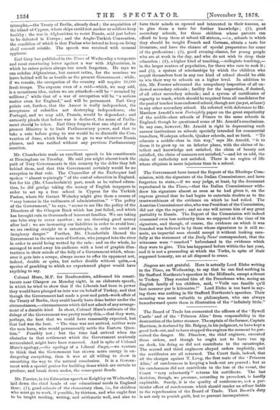Mr. Forster, in his Education speech at Keighley on Wednesday,
laid down the chief heads of our educational needs in England thus ; (1), good schools of the elementary class, i.e., for children who must go to work, if possible, by thirteen, and who ought first to be taught reading, writing, and arithmetic well, and also to
have their minds so opened and interested in their lessons, as to give them a taste for further knowledge ; (2), good
secondary schools, for those children whose parents can afford to keep them at school till sixteen, —i.e., schools in which they should be taught French and German, obtain a taste for literature, and have the chance of special preparation for some of the professions ; (3), good evening-classes, for young people who are at work in the day, and who do not wish to drop their education ; (4), a higher kind of teaching,—collegiate teaching,— in the larger centres of population, for those who care to seek it ; and (5), a system of scholarships by which the children who acquit themselves best in any one kind of school should be able to win their way to schools on a higher level. In addition to this, Mr. Forster advocated the compulsory inspection of all en- dowed secondary schools ; facility for the inspection, if desired, of all other secondary schools ; and a system of certificates of capacity to teach, which should be required from all candidates for the post of teacher in an endowed school, though not (as yet, atleast) in any other secondary school. He referred with deference to Mr. Matthew Arnold's new Fortnightly paper on the great superiority of the middle-class schools of France to the same schools in England, though he questioned some of Mr. Arnold's conclusions. In any case, however, Mr. Arnold is right in deprecating such narrow institutions as schools specially intended for commercial travellers, Wesleyan schools, Quaker schools, and so forth. "To educate a middle-class in this way," says Mr. Arnold, "is to doomit to grow up on an inferior plane, with the claims of in- tellect and knowledge not satisfied, the claim of beauty not satisfied, the claim of manners not satisfied,"—and let us add, the- claim of catholicity not satisfied. There is no region of life where cliquism is more injurious than in a school.


































 Previous page
Previous page